—The Joy of Snow-Viewing Hot Springs— Onsen in the Snow Country Region
Hot spring lodgings in the snow country are often the stage for literary works.
Falling snow makes all kinds of sounds. There is the soft thump-thump of large flakes piling up on one another; the slushy noise of heavy watery snow; and the rhythmical sound of light flakes fluttering in the air.
Snow itself has sounds, but intriguingly it also has the power to muffle all other artificial sounds in the vicinity. The snow country is a quiet world. Maybe it is this tranquility plus relaxation in a steamy hot spring that inspires literary creativity. Yukiguni (tr. Snow Country) by Nobel Prize winner Yasunari Kawabata is the prime example of the depiction of snowy scenes and hot springs, but there are many other works as well. My personal favorite is Karisome (Infatuation) by Junichi Watanabe, where the story unfolds in a snow-blanketed onsen inn.
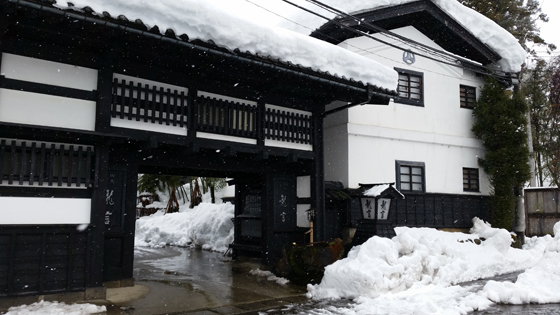
Ryugon onsen inn in Muika-machi
Karisome is the story of a tragic love affair between a middle-aged man and woman, both separately married. The place where they choose to travel to is the Ryugon onsen inn in Muika-machi, Niigata Prefecture. Ryugon is not a fictitious place; it actually exists and is very popular, especially in recent years among foreign tourists, who enjoy the Japanese ambience that can be found there.
Ryugon is an old private residence that was relocated as an inn at the present site. The dignified roadside gate leads to a stout Japanese-style house. Inside, the thick beams and pillars are awesome. This structure clearly was built to stand up to the heavy snowfall in this region. There is a sunken hearth in the lobby, where visitors are invited to rest with a cup of green tea and Japanese confectionery before being shown to their rooms.
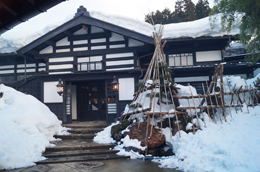
a stout Japanese-style house
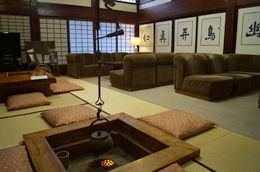
a sunken hearth in the lobby
Muika-machi Onsen was founded in 1957, when hot spring water gushed forth during digging for natural gas. The spring water here is limpid; when you scoop it up in your cupped hands, it looks quite transparent. Just gazing at it is enough to soothe the soul. It really is that crystal-clear.
Ryugon has a simply encircled outdoor bath, from where you can gaze at the snowy scenery while soaking in the spring water. In an outdoor bath, the lower part of you immersed in the water is nice and warm while your protruding head is cold as ice. In Japanese there is a proverb that goes “cool head, warm feet.” Apparently it is good for you to have a cool head and warm legs; what’s more, this condition prevents dizziness when you get out of the bath. So you can enjoy the snowy scenery as long as you like!
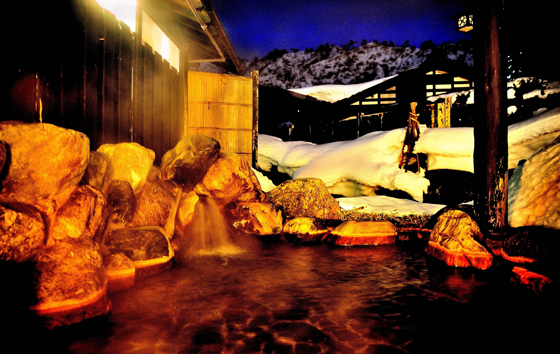
For snow-viewing hot springs, I recommend the onsen resorts in the so-called snow country region, that is, the seven municipalities in the Uonuma district of southern Niigata Prefecture and the area bordering Gunma Prefecture and Nagano Prefecture (Uonuma City, Minami-Uonuma City, Yuzawa-machi, Tokamachi city, Tsunan-machi, Minakami-machi, and Sakae-mura). For example, there is Muika-machi Onsen and Echigo-Yuzawa Onsen in Niigata Prefecture and Minakami Onsenkyo in Gunma Prefecture.
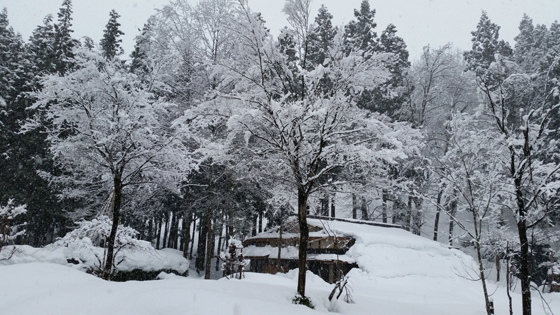
Why does the “snow country region” take the snow country as a theme? It is because this is a region of particularly heavy snowfall. Moist air from the Sea of Japan hits the Echigo Mountain Range and downs buckets of snow on the districts below.
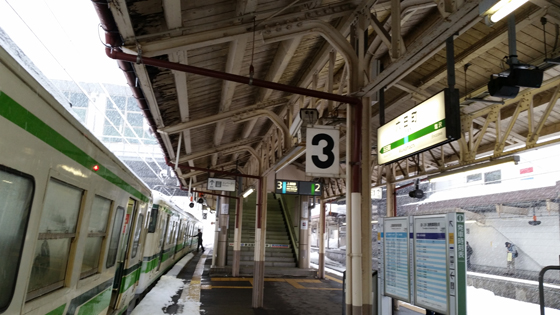
Muika-machi Station on the Joetsu Line
In this article I have introduced Ryugon, formerly a private residence reconstructed into an inn. Ryugon enables foreigners to get a glimpse of the lifestyle of people living in the snow country. The nearest station to Muika-machi Onsen, where Ryugon is located, is Muika-machi Station on the Joetsu Line, a local railway running from Minakami Station in Gunma Prefecture to Nagaoka Station in Niigata Prefecture. So you can make a leisurely journey by local train through Japan’s snow country, which is sure to put you in a literary frame of mind, and then relax in a snow-viewing onsen. The perfect winter trip!

What to Take
When I visit onsen, I always take two Japanese tenugui (hand towels) with me. I go to several baths in a day, so I use one towel when I get out of the water at one place and then use the other towel at the next place. Tenugui are most convenient. As well as being light and compact and therefore easy to carry around, they also dry very quickly. Indeed, tenugui have been fondly used by bathers ever since the Edo period. Look at colored woodblock prints of the time, and you will see both men and women coming out of hot-spring baths with tenugui around their necks.
Before Getting in the Bath
A bathe at a hot spring is relaxing, but in the process you actually consume many more calories than you imagine. If you soak in water with a temperature of 42 degrees Celsius for just 5 minutes, it is said that you consume as many calories as you would during a brisk 10-minute walk. So if you enter a bath on an empty stomach, you might feel unwell afterward. At the same time, though, you don’t want to have a full stomach either. So the golden rule is “not too empty, not too full.” I recommend you to eat something beforehand that gives you a quick calorie boost, like chocolate. Ryokan often provide bean-jam buns and green tea in their rooms. Now you know why!
Japanese-Style Bathing Manners
Foreigners should definitely know about Japanese-style hot-spring bathing manners. First of all, when you enter the bathing facility, there will be a changing room. Undress here and leave your clothes in a locker or basket. Women in particular should then tie up their hair in a bun if necessary. In Japan it is considered unclean to let hair get into the bathwater. Next, take your towel or tenugui and go into the bath area. If there are shower booths, wash your body thoroughly there. If not, scoop some water from the bath using a pail and wash yourself. Then you can get into the hot-spring bath. When you are adequately warmed, go back to the shower booth and this time wash your hair as well as your body. Then get into the hot-spring bath again before drying yourself with your towel and returning to the changing room.
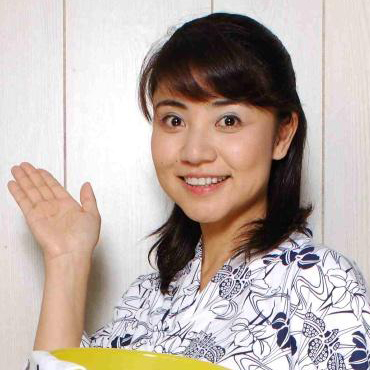
- Category
- Culture、Culture、Hot springs、News、Travel
